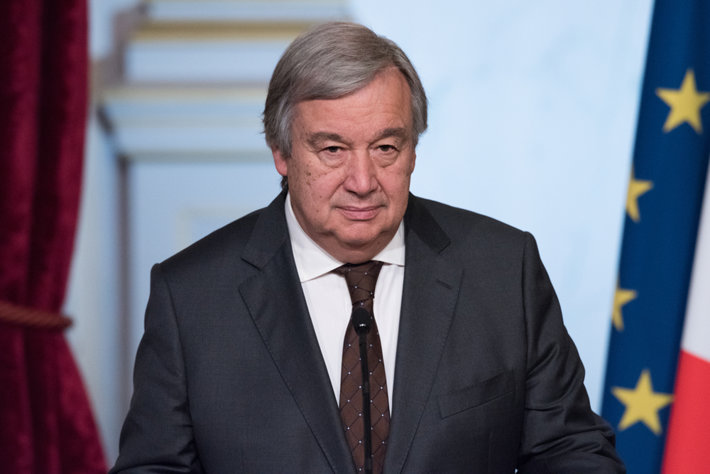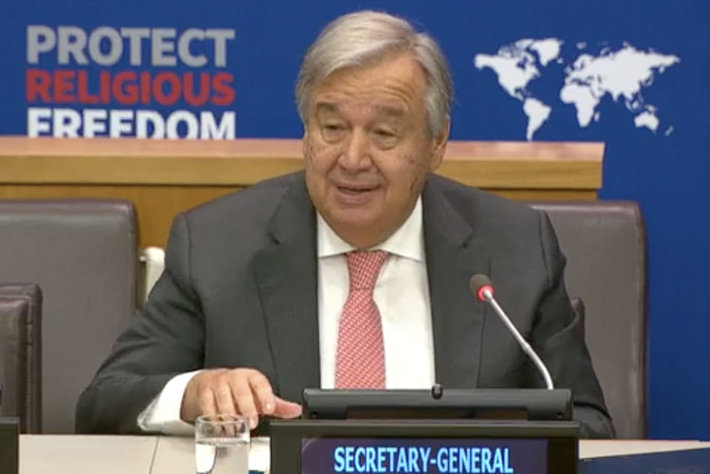War’s insecurities render the world’s poor, marginalized and displaced disproportionately vulnerable to the pandemic, said United Nations Secretary-General António Guterres, who has urged warring countries across the world to lay down their weapons in support of the biggest battle humanity has faced so far in the 21st century—the fight against the COVID-19 pandemic.

“Our world faces a common enemy,” Guterres said in a statement published on the UN website, referring to COVID-19, the disease caused by the coronavirus outbreak sweeping the planet. “The virus does not care about ethnicity or nationality, faction or faith. It attacks all, relentlessly.”
Women, children and the disabled, along with members of communities that have been marginalized or displaced, are the most vulnerable to the insecurities caused by war, the secretary-general said. “They are also at the highest risk of suffering devastating losses from COVID-19,” because health systems have collapsed in war-torn nations.
What’s more, he added, the disease is threatening health professionals, who are in short supply to begin with. And the situation is rendered all the more dangerous because refugees, fleeing wars or the severe economic effects of conflict, are “doubly vulnerable.”
“The fury of the virus illustrates the folly of war,” he said.
Many conflicts across the globe are rooted in religious intolerance or outright bigotry against minority communities.
In Myanmar (formerly Burma), members of the minority Muslim Rohingya community have been victims of indiscriminate killings and other atrocities allegedly carried out by the country’s military forces since 2017.
In neighboring India, the coronavirus outbreak has sparked a spate of recent attacks against Muslims—because of unsubstantiated claims that members of the country’s minority community are spreading the virus. Muslim youth have been assaulted with cricket bats and others have been “beaten, nearly lynched, run out of their neighborhoods or attacked in mosques, branded as virus spreaders,” according to a recent New York Times report.
In Nigeria, Christians and Muslims have been locked in conflict ever since the Islamist military group Boko Haram, who shocked the world with their kidnapping of 267 schoolgirls in 2014, launched military operations in 2009 to create an Islamic state throughout Northeast Nigeria, Northern Cameroon, Niger, Chad and Mali. And other countries such as Somalia and Yemen, have been wracked by religious conflict or civil wars.
In a U.N. report released in March, Guterres warned of a risk that the health consequences of COVID-19 along with the economic impact of the disease will contribute to “enhanced instability, enhanced unrest, and enhanced conflict.” Titled “Shared Responsibility, Global Solidarity: Responding to the socio-economic impacts of COVID-19,” the report points out that the COVID-19 pandemic is “a global health crisis unlike any in the 75-year history of the United Nations—one that is killing people, spreading human suffering, and upending people’s lives.”
“Let us take inspiration from coalitions and dialogue slowly taking shape among rival parties to enable joint approaches to COVID-19,” Guterres said.
Recently, more than 135 member countries of the U.N. General Assembly passed a resolution calling for “intensified international cooperation to contain, mitigate, and defeat the pandemic, including by exchanging information, scientific knowledge, and best practices and by applying the relevant guidelines recommended by the World Health Organization.
“But we need to do much more” to “end the sickness of war and fight the disease that is ravaging our world,” said Guterres. “It starts by stopping the fighting everywhere. Now.”
_______________
From its beginnings, the Church of Scientology has recognized that freedom of religion is a fundamental human right. In a world where conflicts are often traceable to intolerance of others’ religious beliefs and practices, the Church has, for more than 50 years, made the preservation of religious liberty an overriding concern.
The Church publishes this blog to help create a better understanding of the freedom of religion and belief and provide news on religious freedom and issues affecting this freedom around the world.
For more information visit the Scientology website or Scientology.TV.


